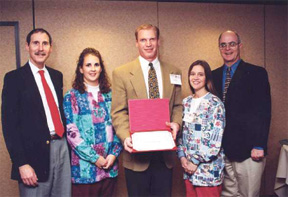 John Peters, M.D., sees the importance of being a volunteer faculty member. His view stems from when he was a student in the ophthalmology department at UNMC from 1989-92.
John Peters, M.D., sees the importance of being a volunteer faculty member. His view stems from when he was a student in the ophthalmology department at UNMC from 1989-92.
“They (volunteer faculty) taught me the importance of their role. Without them, it would have been very difficult for me to obtain not only adequate training, but excellent training,” Dr. Peters said. “You learn more than just the facts from them — you learn how to treat patients and staff and how to conduct yourself professionally — so really the influence they have on you is more than just academic.”
Dr. Peters, who has volunteered his services since entering private practice in Omaha in 1993, was recognized for his volunteer work with residents by receiving the Volunteer Faculty of the Month Award for September 2002.
“It’s a very great honor because I’m not accustomed to being appreciated. Many chairmen take you for granted, but Dr. (Carl) Camras does not do that,” Dr. Peters said. “And so it’s very kind of him to make an effort to have those who teach his residents be appreciated for what they do. Obviously, he realizes that that’s important, and I think the residents probably verbalize to him that they appreciate it, too.”
Born in Lincoln, Dr. Peters attended Creighton University, where he earned a bachelor’s degree in 1983. He then took graduate courses in molecular genetics at Creighton University and at the University of Nebraska-Lincoln during 1983-84 and received his medical degree from Creighton University School of Medicine in 1988. After completing his residency in 1992, Dr. Peters did a fellowship at the University of Florida before returning to Nebraska.
“As an alumnus of our program, John Peters has always put the best interest of the department ahead of his own by providing teaching and mentoring to the residents in the ophthalmology department,” said Dr. Camras, chairman of the department.
Said Dr. Peters: “I would have to say the most rewarding aspect of being involved with the program is just seeing the development of the residents from when they first begin the program to when they graduate.”